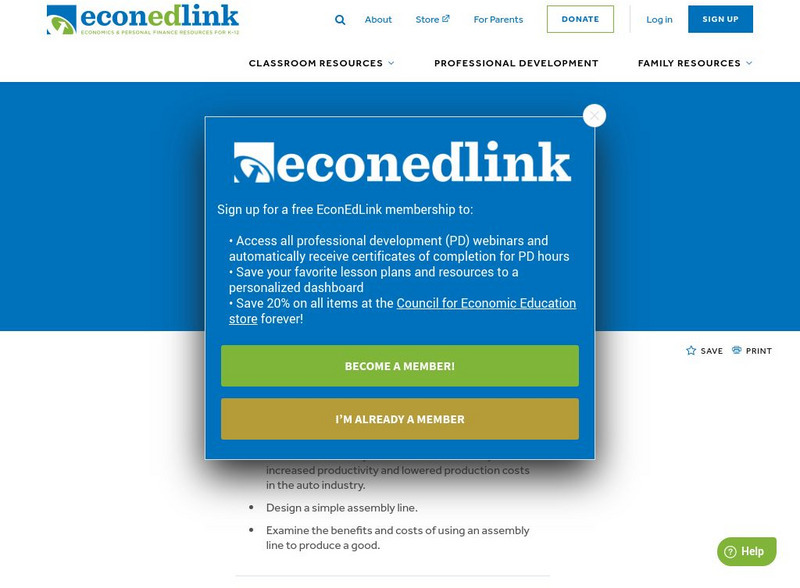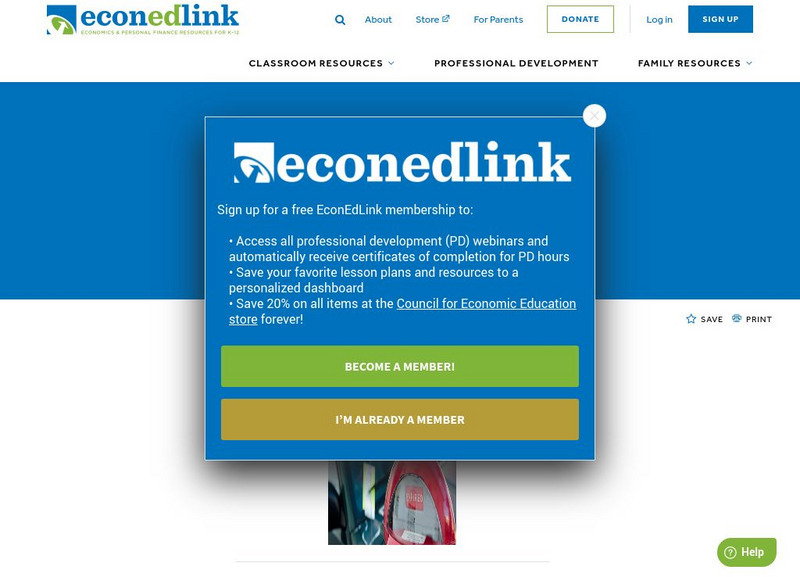Council for Economic Education
Econ Ed Link: Henry Ford and the Model T: A Case Study in Productivity (Part 3)
Henry Ford's use of mass production strategies to manufacture the Model T revolutionized industrial manufacturing. This 3-part learning unit provides students with the story of Henry Ford and the Model T from an economics perspective....
Council for Economic Education
Econ Ed Link: Henry Ford and the Model T: A Case Study in Productivity (Part 1)
Henry Ford's use of mass production strategies to manufacture the Model T revolutionized industrial manufacturing. This 3-part learning unit provides students with the story of Henry Ford and the Model T from an economics perspective....
Council for Economic Education
Econ Ed Link: Rationalizing Transplants
This lesson encourages students to explain the consequences of a non-market rationing process, to evaluate the consequences of restricting organ transplants to U.S. citizens, and to suggest alternative policies to reduce the scarcity of...
Council for Economic Education
Econ Ed Link: Government Spending: Why Do We Spend the Way We Do?
This lesson plan reviews how the government spends money. It shows how the government's needs have changed over the years. To learn more about this area of economics use this informative website.
Council for Economic Education
Econ Ed Link: The Role of Government: The Federal Government and Fiscal Policy
Young scholars will visit "A Citizen's Guide to the Federal Budget" and use the federal government website to obtain information which will help them understand basic information about the budget of the United States Government for the...
Council for Economic Education
Econ Ed Link: Bringing the Market to the Farm
This printable lesson discusses producers and consumers from an agricultural perspective. It focuses on choices that the consumer has with regard to purchasing agricultural goods (e.g. fruits and vegetables). As an example, it uses...
Council for Economic Education
Econ Ed Link: Break a Leg
In this lesson, students will learn about the basic components and terminology of individual health insurance. Students will make decisions about the value of insurance protection and you will identify trends in the cost of medical care...
Council for Economic Education
Econ Ed Link: Timing Is Everything
In the first part of the lesson, students examine the incentives and opportunity costs of spending and saving in a teacher directed lesson. The remainder of the lesson is an interactive website. Students work through problems that...
Council for Economic Education
Econ Ed Link: Do You Have a Yen to Go to College?
Help Carlos determine his financing options for college based on his current level of investment and the financial packages offered by several different schools. Evaluate these options, and then recommend which path Carlos should take to...
Council for Economic Education
Econ Ed Link: No Room for a Sneeze
This lesson plan teaches students about scarcity and standard of living. In the book "No Room for a Sneeze", a folktale retold by Robyn Supraner, a farmer and his wife must deal with scarcity in their home so they turn to the Wiseman for...
Council for Economic Education
Econ Ed Link: Widget Production: Producing More, Using Less
This is an extension of a lesson called "Widget Production" and discusses a lesson plan on increasing productivity.
Council for Economic Education
Econ Ed Link: Classroom Cash Incentive Plan
Learn more about the economy through this informative lesson. "In this lesson, you will learn how the incentive program affects the personal choices you make in class. You will also analyze how economic incentives can affect behavior."
Council for Economic Education
Econ Ed Link: Buy a Bond, James: A Lesson on Us Savings Bonds
This site is extremely informative for teaching children the value of saving money. "You will write a persuasive letter telling why people use savings bonds as a way to save their money."
Council for Economic Education
Econ Ed Link: You've Won the Lottery! Now What?
You won the lottery! The lottery officials have given you a choice. You can either receive the $10 million now in one lump sum, or you can receive $1 million a year for the next 20 years. Now what do you do?
Council for Economic Education
Econ Ed Link: Loan Amortization Mortgage
How to amortize a loan using an Excel spreadsheet.
Council for Economic Education
Econ Ed Link: u.s. Senate Mulls Over Bankruptcy Legislation
During the week of September 20, 1998, the US Senate agreed to debate a bill (S 1301), intended to make it more difficult for people of means to use bankruptcy to walk away from debt. Those who could pay at least 20 percent of their...
Council for Economic Education
Econ Ed Link: Deregulation and the California Utilities
"The verdict is in: California's experiment with energy deregulation is not just a mess; it's a certifiable failure, according to everyone from the state governor to the very utilities that initially backed the scheme." This is how...
Council for Economic Education
Econ Ed Link: Focus on Economic Data
This lesson focuses on the second estimate of U.S. real gross domestic product for the fourth quarter (Q4) of 2012, as reported by the U.S. Bureau of Economic Analysis (BEA) on February 28, 2013. The current data and historical GDP data...
Council for Economic Education
Econ Ed Link: Focus on Economic Data
This lesson focuses on the May 1, 2013, press release by the Federal Reserve System's Federal Open Market Committee (FOMC) on the current Federal Reserve monetary policy actions and goals, and specifically, the federal fund's rate...
Council for Economic Education
Econ Ed Link: You Decide!
Think about a difficult decision you have had to make. After you decided did it work out? Why or why not? Why do you think decisions and choices are hard to make? We make personal decisions and we make decisions as groups. There is a...
Council for Economic Education
Econ Ed Link: What Are Incentives?
Young scholars will understand that incentives are used to encourage them to make good choices. After identifying incentives offered at home and in school, the students will distinguish between positive and negative incentives.
Council for Economic Education
Econ Ed Link: The Best Deal
Students will learn how to determine 'price per unit' to help make decisions when comparing products.
Council for Economic Education
Econ Ed Link: Inventive Incentive
There are many ways in which people are rewarded or penalized for doing, or not doing, their work. These are known as incentives.
Council for Economic Education
Econ Ed Link: Incentives Influence Us
Find out more about the concept of incentives in our economy through this lesson plan. "You will identify incentives used at home and school."















